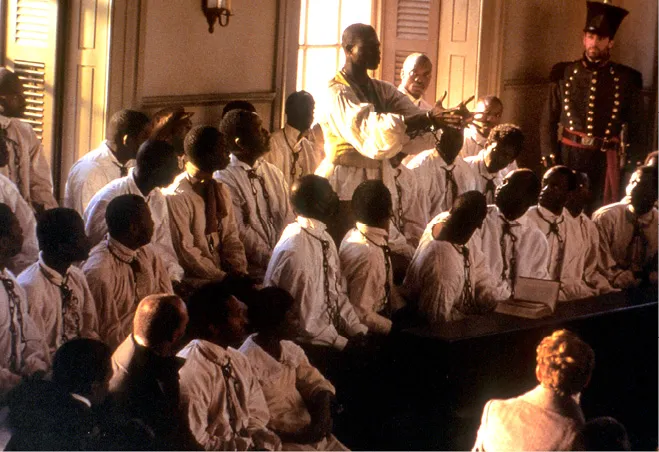![]()
Chapter 1
Prejudice On Trial
Prejudice against “the other” is an enduring human trait. Prejudice intrudes into the justice system in the form of discrimination based on race, gender, disability, or sexual orientation. As in real trials, some of the reel trials reviewed in this chapter represent inspiring victories by victims of discrimination, while others represent tragic defeats.
Amistad
1997
Starring: Matthew McConaughey, Anthony Hopkins, Djimon Hounsou
Director: Steven Spielberg
Opening Statement
Cinque leads a successful mutiny by captured Africans aboard the slave ship Amistad. The mutineers kill everyone on board except for two Spanish slave traders who betray them by sailing the ship to the U.S. A tangle of litigation begins in the Connecticut federal district court and in 1841 ends up in the U.S. Supreme Court. There, former President John Quincy Adams urges the justices to set the captives free.
Courtroom Closeups
The charges of piracy and murder subject the mutineers to the death penalty. But three other parties intervene and with different motives seek to keep the captives alive. U.S. President Martin Van Buren argues that under a treaty the captives are Spain’s property. Two Naval officers claim that salvage rights make them the rightful owners of the captives and the ship. The Spanish slave traders claim that they own the captives, who they purchased legally because the captives were born in Cuba (at the time a Spanish colony). Opposing them all is attorney Roger Baldwin, who argues that Cinque and the other captives were captured illegally in Sierra Leone, a British protectorate that does not allow slavery. Cinque’s testimony and documents aboard the Amistad convince the judge that the captives were born in Sierra Leone. Though he was handpicked by Pres. Van Buren, the judge sets them free and orders the government to return them to their home. Van Buren apppeals to the U.S. Supreme Court. Seven of the nine justices are Southern slave owners.
Amistad. Cinque (Djimon Hounsou) and his fellow slaves assert their right to freedom after hijacking the Amistad. DreamworkSKG/Photofest
Van Buren does not want the slaves to go free because it might cost him the support of the Southern states in the upcoming election.
Baldwin forgoes broad moral arguments about the evils of slavery in favor of a narrow focus on the legal status of the captives as citizens of Sierra Leone.
Baldwin convinces former President John Quincy Adams to argue the case for freeing the captives in the Supreme Court. Adams argues, “The natural state of mankind is not slavery but freedom…If it means civil war let it come. And when it does, may it be finally the last battle of the American Revolution.”
The Court frees the captives. The decision states that the captives are free individuals “who had the right to engage in insurrection against those who would deny them their freedom.”
Cinque’s testimony that the captives were seized in Africa was critical. Had the captives been Cuban, their purchase by the slave traders would have been legal. They would not have been entitled to seize the Amistad since they had no freedom to defend. Under Article 9 of the 1795 treaty between the U. S. and Spain, the courts would have to return them to their lawful owners.
Beyond the Courtroom
After Pres. Van Buren replaced the Connecticut jury and trial judge with his hand-picked replacement, an abolitionist cynically responds by saying he is “embarrassed to admit that I was under the misconception that our executive and judicial branches were separate.”
For the Record
Justice Story, who announces the Supreme Court’s opinion, was played by then-retired Supreme Court Justice Harry Blackmun.
Adams’ actual argument lasted eight and one-half hours, quite a contrast to the modern Supreme Court where arguments are usually limited to 30 minutes. Some of Adams’ argument in the film is fictitious. For example, he didn’t welcome the Civil War.
The Court’s opinion did not question the institution of slavery in the U.S. or in Cuba. Only a few years later, in the notorious Dred Scott case (1857), the Court held that American slaves could not be treated as citizens, even if they escaped to free states. Nevertheless, the Amistad case is one of the greatest civil rights decisions in the history of the Supreme Court and a monument to its independence from the executive branch.
Based on two words in a memoir of antislavery activist George Thompson that Cinque “conducted badly” in Sierra Leone, rumors developed that Cinque became a slave trader after his return from America. However, the rumors are undoubtedly false.
Roger Baldwin was a grandson of one of the signers of the Declaration of Independence. He later became Governor of Connecticut and a U.S. Senator. One of his co-counsel in the case was Seth Staples, who founded the Yale Law School.
Barbara Chase-Riboud sued the film’s producer DreamWorks and Steven Spielberg, claiming that the film infringed on her book Echo of Lions. A court refused her request to halt the opening of the film. Later, Chase-Riboud dismissed her lawsuit and praised the film, but whether she got any money has never been disclosed. Many argued that the litigation seriously damaged Amistad’s Oscar prospects.
Ghosts of Mississippi
1996
Starring: Alec Baldwin, James Woods, Whoopi Goldberg
Director: Rob Reiner
Opening Statement
Two 1964 trials of violent southern white racist Byron de la Beckwith for assassinating bl...












